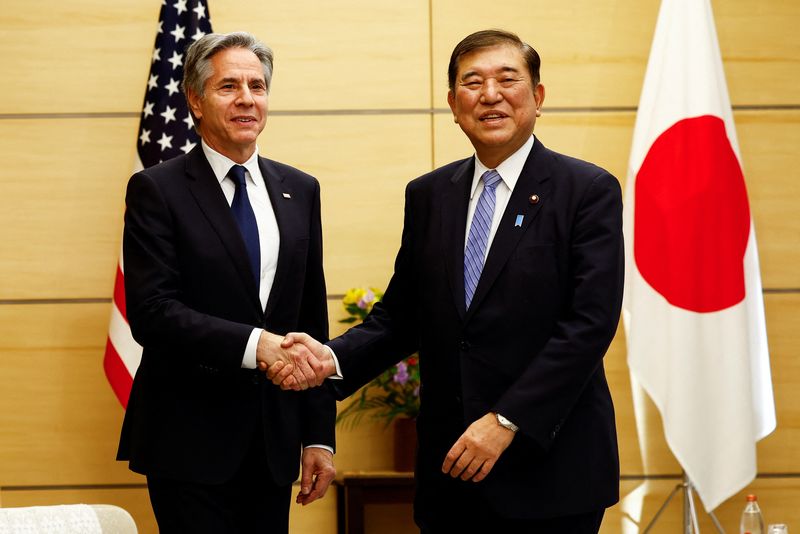(Corrects title to Takeshi, not Takashi, in paragraph 3 of Jan. 7 story)
By David Brunnstrom, Simon Lewis (JO:), Trevor Hunnicutt and Tim Kelly
TOKYO/WASHINGTON (Reuters) -The international ministers of Japan and the USA stated their international locations’ ties had been stronger than ever on Tuesday, even after Japan’s prime minister referred to as U.S. President Joe Biden’s choice to dam Nippon Metal’s $14.9 billion bid for U.S. Metal “perplexing.”
Biden’s transfer final Friday was a jolt to U.S. efforts to spice up ties simply as neighboring South Korea’s political disaster probably complicates a deepening trilateral relationship between Washington, Seoul and Tokyo shaped to counter China’s rising navy energy.
On Monday, Japanese Prime Minister Shigeru Ishiba expressed confusion over Biden’s choice, however after assembly in Tokyo on Tuesday, U.S. Secretary of State Antony Blinken and Japan’s Overseas Minister Takeshi Iwaya hailed bilateral ties as stronger than ever.
In remarks to the media, at which no questions had been taken, Blinken didn’t point out Nippon Metal, however an announcement from Japan’s international ministry stated he and Iwaya “exchanged views on the economy, including on the acquisition of United States Steel (NYSE:) Corporation by Nippon Steel Corporation.”
It stated they “reaffirmed the importance of Japan-U.S. economic relations, including investments by Japanese companies in the U.S.”
Blinken stated the 2 international locations had been “leading the way” in cooperation between like-minded international locations and added: “I have great confidence that will continue for many, many years to come.”
After assembly Ishiba at his residence, Blinken didn’t reply to questions shouted by reporters in regards to the potential impression of Biden’s choice on bilateral ties.
Analysts say that whereas it may have a chilling impact on Japanese funding into the U.S., any injury to their wider relationship will in all probability be restricted given the 2 international locations’ shared safety issues about China.
Business lobbies in each Japan and the U.S. have pushed exhausting for the merger, backing their arguments up with warnings in regards to the impact on the very important U.S.-Japan relationship.
But it surely nonetheless confronted opposition from each Biden and President-elect Donald Trump, who takes workplace on Jan. 20 and was assiduously courted by Japan within the run as much as his re-election.
Forward of his journey, the State Division stated Blinken wished to construct on the momentum of U.S.-Japan-South Korea trilateral cooperation.
In Seoul on Monday, Blinken reaffirmed confidence in South Korea’s dealing with of its political turmoil as investigators there sought to increase a warrant for the arrest of impeached President Yoon Suk Yeol.
Trump’s allies have additionally reassured Seoul and Tokyo he’ll assist persevering with efforts to enhance ties and advance navy, financial and diplomatic cooperation to counter China and North Korea, Reuters reported forward of the U.S. election.
TENSION, LIMITED DAMAGE FROM NIPPON STEEL DECISION
Nippon Metal and U.S. Metal filed a lawsuit on Monday charging that Biden violated the U.S. Structure by blocking their merger by means of what they termed a sham nationwide safety evaluate. They referred to as for the U.S. federal court docket to overturn the choice.
A Japanese diplomat instructed Reuters Biden’s transfer may chill international direct funding, however hoped shut U.S.-Japan relations would proceed, with a powerful emphasis on re-establishing the robust ties with Trump seen throughout his earlier administration, and profiting from the more and more hawkish temper in Washington on China.
Nicholas Szechenyi, a Japan skilled at Washington’s Middle for Strategic and Worldwide Research, stated Japan wouldn’t let the choice poison the U.S.-Japan relationship. “It’s too important for Japan’s national security,” he stated.
Trump reiterated after his election win that he was “totally against” the merger and vowed to dam it as president and assist U.S. Metal with tax breaks and tariffs.
A former senior official in Trump’s first administration instructed Reuters he believed Trump would have taken the identical strategy as Biden.

Marc Busch, a fellow at Georgetown College’s McDonough Faculty of Business, forecast “significant fallout” for U.S. efforts to work with allies to create resilient provide chains within the face of Chinese language dominance or competitors in key areas.
“Japan and other allies will have doubts about investing in or aligning with politically sensitive U.S. supply chains,” he stated. “China must be chuckling to itself that it could never have hoped for a better outcome.”




